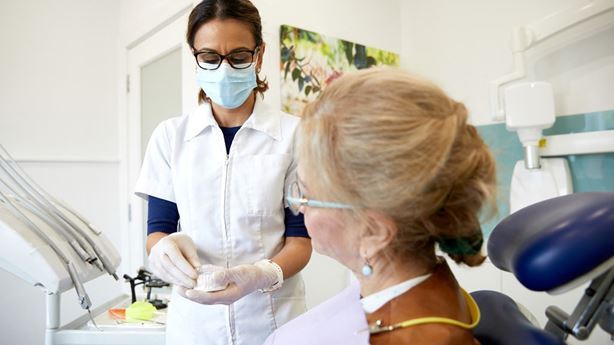Can Someone With Periodontal Disease Get Implants?
Are your teeth giving you cause for concern? Perhaps it’s your gums that are making you miserable? Whatever your reasons for disliking your smile may be, the important thing to remember is that it’s never too late to do something about it.
If your teeth are leaving you self-conscious, or if they simply need removing, you’ll likely have spoken to your dentist about dental implants. Dental implants are hugely popular in the world of orthodontics as they basically serve as aesthetic replacements for teeth.
A dental implant is a replacement tooth root. The procedure is complex but to summarise, a screw is implanted into the mouth and left for the jawbone to fuse to it. Now, false teeth, either removable or permanent, can be attached to the screws and left to serve as replacement teeth.
The main concern with dental implants, however, is gum disease. So, can someone with periodontal disease get implants?
What is periodontal disease?
Periodontal disease, perhaps better known as gum disease, is a common oral condition in which the gums of an individual will become swollen, inflamed, sore, and tender.
Sometimes known as periodontitis, this infection of the gums is caused by bacteria within plaque being allowed to build up and accumulate on and around the gums.
Gum disease can cause the gums to become sore, swollen, inflamed, and tender, though it can also cause them to recede, and eventually cause tooth loss. In fact, gum disease is the main cause of tooth loss in adults.
Dental implants and gum disease
If you lose your teeth via gum disease, naturally one of your main concerns will be whether or not you can get dental implants. Unfortunately, the answer is no.
If your gum disease is so advanced that it has caused tooth loss, chances are it will also have caused a loss of bone tissue too, which means that the implants would have nothing to screw into and fuse to.
Can gum disease affect dental implants?
If you’ve already had dental implants, you might be concerned about whether gum disease can affect them, and rightly so.
Periodontal disease can indeed affect dental implants because it can spread and if it weakens the gums and/or the bone tissue the implants are screwed into, they will eventually fail. There is in fact a technical term for this used by dentists and that is peri-implantitis.
This is yet another reason to remember to practice good oral hygiene, even if you have dental implants.
Signs that your dental implant is failing
If you do have dental implants and you’re concerned about periodontal disease affecting them, it’s important to be aware of the signs that your dental implant is failing. The earlier you spot the warning signs, the quicker you can act and do something to stop it.
Here’s a look at several signs that your dental implants might be failing due to gum disease:
Pain or discomfort
The idea behind having dental implants, at least in part, is that they stop any pain or discomfort that may have been caused by bad or rotten teeth.
Dental implants should NOT hurt. If you do start to experience any discomfort or pain in or around your dental implant, this could be due to the fact that it is in the early stages of failure.
Visible receding of the gums
Another sign that your implant may be failing due to gum disease is receding of the gums.
If you can see your gums starting to recede around the implant site, chances are this is caused by gum disease and it won’t be long before it begins to affect the bone surrounding it.
Visible pus
It sounds disgusting, we know, but if you have any visible pus on and around the area where your implant is, this indicates an infection, which could result in the implant failing.
Bad breath
We all get a bit of bad breath now and then, especially in the morning or after eating garlic, but if you experience halitosis (bad breath) on a regular basis, this could be caused by bacteria-ridden plaque causing a slow infection of the gums.
Visible threads on the implant
A dental implant is basically a screw in the mouth.
If you can see visible threads on the implant, this shows that it is not screwed in as deep as it was originally. This means there is less support and eventually, if it carries on, it will fall out and the implant will have failed.
Bleeding around the implant area
Gum disease causes the gums to weaken which means that they bleed when placed under even the smallest amounts of pressure.
If your gums suddenly start bleeding when brushing, this could be caused by gum disease which means that your implants are at risk of failing.
What is the best treatment for peri-implantitis?
As mentioned, if you are concerned about your dental implants failing, it’s important to know the warning signs and to act fast.
Luckily the easiest way to treat and prevent peri-implantitis is simply to practise good oral hygiene. Brush your teeth twice daily, floss carefully, use an antibacterial mouthwash, and make sure to visit your dentist for regular check-ups at least bi-annually.
If you’re concerned your dental implant may be failing, don’t sit around and wait for it to get worse, get in touch with the friendly team at Tuart Hill Dental now.
Our dentists are highly experienced when it comes to peri-implantitis, gum disease, and good oral hygiene in general and can help you rectify the issue before it becomes a major issue.








